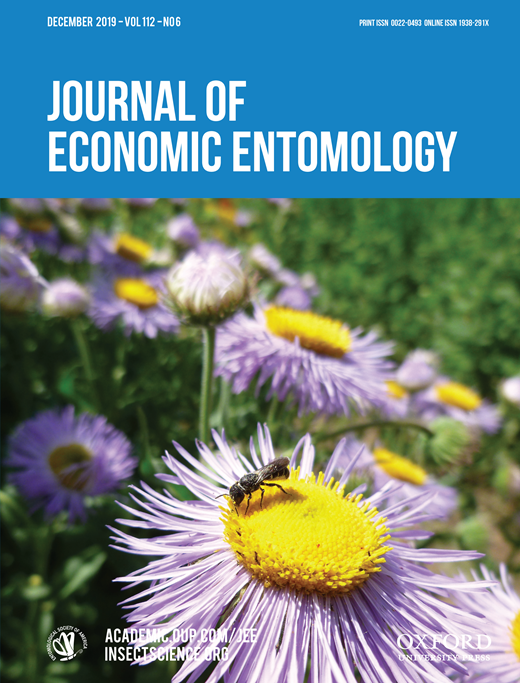Ver ítem
- xmlui.general.dspace_homeCentros Regionales y EEAsCentro Regional Patagonia NorteEEA BarilocheArtículos científicosxmlui.ArtifactBrowser.ItemViewer.trail
- Inicio
- Centros Regionales y EEAs
- Centro Regional Patagonia Norte
- EEA Bariloche
- Artículos científicos
- Ver ítem
Effect of vegetable oils as Phagostimulants in adults of Dichroplus vittigerum (Orthoptera: Acrididae)
Resumen
Several species of grasshoppers are attracted to vegetable oils. These oils have kairomonal properties mainly due to the presence of linolenic and linoleic fatty acids. This study aimed to determine whether the odors of canola, flax, and olive oils are attractive to Dichroplus vittigerum (Blanchard 1851) and if they induce preference and feeding. We conducted three bioassays to determine whether oil modifies attraction and feeding behavior of this
[ver mas...]
Several species of grasshoppers are attracted to vegetable oils. These oils have kairomonal properties mainly due to the presence of linolenic and linoleic fatty acids. This study aimed to determine whether the odors of canola, flax, and olive oils are attractive to Dichroplus vittigerum (Blanchard 1851) and if they induce preference and feeding. We conducted three bioassays to determine whether oil modifies attraction and feeding behavior of this grasshopper. We first determined the attraction of the oils using a wind tunnel, secondly evaluated phagostimulation produced by the oils, and finally performed preference tests comparing consumption of
Taraxacum officinale (Weber ex F.H.Wigg. 1780, Asterales: Asteraceae) leaves treated with the oils versus control leaves. Even though all of the oils induced attraction, only flax oil acted as a phagostimulant. However, the oils did not determine the preference and did not increase feeding on leaves. We hypothesize that T. officinale leaves are inherently attractive and treatment with oils did not affect feeding on them. Our results provide a starting point to develop baits that can be used to attract and control these harmful insects, presenting flax oil as a potential bait for D. vittigerum since its odor was both attractive and led to increased feeding or phagostimulation. Future studies should test the effect of the oils on other plant species or at varying doses, under field conditions.
[Cerrar]

Autor
Sepúlveda, Luciana Vanesa;
Pietrantuono, Ana Laura;
Buteler, Micaela;
Fernandez Arhex, Valeria Cristina;
Fuente
Journal of economic entomology 112 (6) : 2649-2654. (December 2019)
Fecha
2019-12
Editorial
Entomological Society of America
ISSN
0022-0493
Formato
pdf
Tipo de documento
artículo
Palabras Claves
Derechos de acceso
Restringido
 Excepto donde se diga explicitamente, este item se publica bajo la siguiente descripción: Creative Commons Attribution-NonCommercial-ShareAlike 2.5 Unported (CC BY-NC-SA 2.5)
Excepto donde se diga explicitamente, este item se publica bajo la siguiente descripción: Creative Commons Attribution-NonCommercial-ShareAlike 2.5 Unported (CC BY-NC-SA 2.5)

